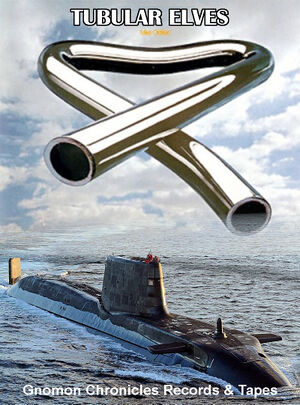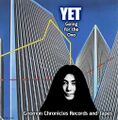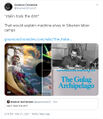Tubular Elves: Difference between revisions
No edit summary |
No edit summary |
||
| (4 intermediate revisions by the same user not shown) | |||
| Line 1: | Line 1: | ||
[[File:Tubular Elves.jpg|thumb|Earliest known poster for '''''Tubular Elves'''''.]]'''''Tubular Elves''''' is a short documentary film about how the album ''Tubular Bells'' accidentally recorded machine elves during UK military submarine communication tests. | [[File:Tubular Elves.jpg|thumb|Earliest known poster for '''''Tubular Elves'''''.]]'''''Tubular Elves''''' is a short documentary film about how the album ''Tubular Bells'' accidentally recorded machine elves during UK military submarine communication tests. | ||
== Nonfiction: The album Tubular Bells accidentally contains Morse code sent to UK military submarine == | |||
Mike Oldfield recorded the classic Tubular Bells in the early 1970s at Richard Branson's studio in Shipton-on-Cherwell, England. About an hour away from there was a huge wireless transmitter called Rugby Radio where, among other broadcasts, the UK government delivered very-low-frequency (VLF) transmissions to submarines. Turns out, a 16 kilohertz signal—Morse code of the station's call sign and the word "testing"—was inadvertently picked up by the recording gear at the music studio and made it onto Tubular Bells. As David Schneider explains, monitoring changes in VLF signals as they travel around the world can also be used to monitor space weather using just $70 of equipment and a laptop computer. From IEEE Spectrum: | Mike Oldfield recorded the classic Tubular Bells in the early 1970s at Richard Branson's studio in Shipton-on-Cherwell, England. About an hour away from there was a huge wireless transmitter called Rugby Radio where, among other broadcasts, the UK government delivered very-low-frequency (VLF) transmissions to submarines. Turns out, a 16 kilohertz signal—Morse code of the station's call sign and the word "testing"—was inadvertently picked up by the recording gear at the music studio and made it onto Tubular Bells. As David Schneider explains, monitoring changes in VLF signals as they travel around the world can also be used to monitor space weather using just $70 of equipment and a laptop computer. From IEEE Spectrum: | ||
| Line 17: | Line 17: | ||
File:The Trouble With Triffids.jpg|link=The Trouble With Triffids|"'''[[The Trouble With Triffids]]'''" is one of the "Forbidden Episodes" of the television series ''Star Trek''. | File:The Trouble With Triffids.jpg|link=The Trouble With Triffids|"'''[[The Trouble With Triffids]]'''" is one of the "Forbidden Episodes" of the television series ''Star Trek''. | ||
File:Going for the Ono.jpg|link=Going for the Ono|'''''[[Going for the Ono]]''''' is the eighth studio album by English progressive rock band Yet. It is the only Yet album to feature Yoko Ono. | File:Going for the Ono.jpg|link=Going for the Ono|'''''[[Going for the Ono]]''''' (1977) is the eighth studio album by English progressive rock band Yet. It is the only Yet album to feature Yoko Ono. | ||
File:Titration Zebra.jpg|link=Titration Zebra|'''''[[Titration Zebra]]''''' is a 1963 thriller novel by Scottish author Alistair MacLean about a reagent, termed the titrant or titrator, which is prepared as a standard solution of known concentration and volume. The titrant reacts with a solution of analyte (which may also be termed the titrand) to determine the analyte's concentration. The volume of titrant that reacted with the analyte is termed the titration volume. | File:Titration Zebra.jpg|link=Titration Zebra|'''''[[Titration Zebra]]''''' is a 1963 thriller novel by Scottish author Alistair MacLean about a reagent, termed the titrant or titrator, which is prepared as a standard solution of known concentration and volume. The titrant reacts with a solution of analyte (which may also be termed the titrand) to determine the analyte's concentration. The volume of titrant that reacted with the analyte is termed the titration volume. | ||
| Line 40: | Line 40: | ||
== External links == | == External links == | ||
* [https://boingboing.net/2022/01/24/the-album-tubular-bells-with-the-exorcist-theme-accidentally-contains-morse-code-sent-to-uk-military-submarine.html The album Tubular Bells (with The Exorcist theme) accidentally contains morse code sent to UK military submarine] @ Boing Boing | |||
* [https://en.wikipedia.org/wiki/Rugby_Radio_Station Rugby Radio Station] @ Wikipedia | |||
* [https://en.wikipedia.org/wiki/Tubular_Bells Tubular Bells] @ Wikipedia | |||
=== Social media === | |||
* [https://twitter.com/GnomonChronicl1/status/1512835646695616513 Post] @ Twitter (9 April 2022) | |||
* [https://twitter.com/GnomonChronicl1/status/1485810600274018308 Post] @ Twitter (24 January 2022) | * [https://twitter.com/GnomonChronicl1/status/1485810600274018308 Post] @ Twitter (24 January 2022) | ||
[[Category:Fiction (nonfiction)]] | [[Category:Fiction (nonfiction)]] | ||
Latest revision as of 10:32, 19 August 2023
Tubular Elves is a short documentary film about how the album Tubular Bells accidentally recorded machine elves during UK military submarine communication tests.
Nonfiction: The album Tubular Bells accidentally contains Morse code sent to UK military submarine
Mike Oldfield recorded the classic Tubular Bells in the early 1970s at Richard Branson's studio in Shipton-on-Cherwell, England. About an hour away from there was a huge wireless transmitter called Rugby Radio where, among other broadcasts, the UK government delivered very-low-frequency (VLF) transmissions to submarines. Turns out, a 16 kilohertz signal—Morse code of the station's call sign and the word "testing"—was inadvertently picked up by the recording gear at the music studio and made it onto Tubular Bells. As David Schneider explains, monitoring changes in VLF signals as they travel around the world can also be used to monitor space weather using just $70 of equipment and a laptop computer. From IEEE Spectrum:
I purchased an old CD of Tubular Bells, ripped a WAV file of one track, and piped it into a software-defined-radio package. Tuning to 16 kHz and setting the SDR software to demodulate continuous-wave signals immediately revealed Morse code. I couldn’t copy much of it, but I could make out many repetitions of VVV (“testing”) and GBR (the station’s call sign).
- The album Tubular Bells (with The Exorcist theme) accidentally contains morse code sent to UK military submarine @ Boing Boing
In the News
"The Trouble With Triffids" is one of the "Forbidden Episodes" of the television series Star Trek.
Going for the Ono (1977) is the eighth studio album by English progressive rock band Yet. It is the only Yet album to feature Yoko Ono.
Titration Zebra is a 1963 thriller novel by Scottish author Alistair MacLean about a reagent, termed the titrant or titrator, which is prepared as a standard solution of known concentration and volume. The titrant reacts with a solution of analyte (which may also be termed the titrand) to determine the analyte's concentration. The volume of titrant that reacted with the analyte is termed the titration volume.
Rumors of machine elves in Siberian labor camps are finally taken seriously by political scientists not under the influence of DMT.
Wheel of Candy is a 1992 American gothic supernatural horror film about a graduate student completing a thesis on the legend of the "Candyman", the ghost of a game show host who was murdered for rigging the game.
Fiction cross-reference
- Gnomon algorithm
- Gnomon Chronicles
- Going for the Ono
- Machine elves in Siberian labor camps
- Titration Zebra
- Wheel of Candy
Nonfiction cross-reference
External links
- The album Tubular Bells (with The Exorcist theme) accidentally contains morse code sent to UK military submarine @ Boing Boing
- Rugby Radio Station @ Wikipedia
- Tubular Bells @ Wikipedia
Social media





